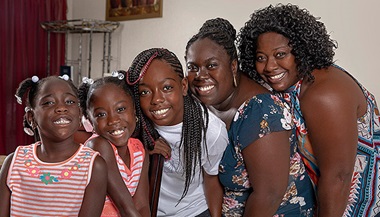Patient Story
Sickle Cell Disease: Desmond's Story

When Desmond was born, his mother called him the “glass baby.”
“He was so small and so delicate,” she recalls, “that when he swelled, he looked like his skin would burst.” Nurses in her hospital in Indiana handed Shentrella a book that had everything a mother would need to know about sickle cell anemia.
“I didn’t know anything about it, but I read that book cover to cover and I joined support groups,” she says. The first few years were scary, but manageable, with regular blood transfusions every three months. When Desmond was 4, the single mom and her five children moved to Florida and almost immediately, Desmond suffered a stroke. “I had never heard of a child having a stroke, but there it was in my book,” she laughs — now. At the time, it was terrifying.
The family found its way to Johns Hopkins All Children’s Sickle Cell Program and began a near life-long relationship between Desmond and the hospital. Desmond survived another stroke at age 6 and a blood clot in his heart at age 20.
“I trust them,” Desmond, now 21, says. “They have taken care of me since I was a kid. They’ve helped me so much over the years with figuring out my disease, how to deal with high school. They made me feel normal.” Now, Desmond is aging out of the pediatric program and the hospital’s new Transition Program helped him find his way in managing his own disease, taking his own medications, making his own doctor appointments and more.
“I’m just scared. I’ve been going there since I was 4. They know me and every single thing that has happened with my care. A new doctor won’t know me.” He looks down and shakes his head. Then he remembers the positive. He credits the sickle cell team with giving him the courage to join ROTC in high school and to start going to the gym to build up his veins and increase blood flow, a key in living with sickle cell.
The hospital, along with his incredible family, has given Desmond support, encouragement and confidence.
Desmond was asked to speak at the 2019 Transition Day as he moved from pediatric to adult care.
“I just want them to know it will get better, you have to be strong,” he says. “You can do this. That’s my motto.”
Despite his often strong, positive and upbeat attitude, Desmond has had a rough year. After having managed his disease without any major problems over the last eight years, the blood clot was a big emotional setback.
“His brother, De’Andre, saved his life from that blood clot,” his still-amazed mom recalls. “His brother was off to work, but, because the kids are so protective of each other, he just wanted to peek in Desmond’s room before he left. Desmond’s face was swollen and his airway was closing. He was scared. They thought it was an allergic reaction, but De'Andre got Desmond to the Emergency Center and they realized there was a blood clot in his heart. He got a stent.”
His mother, whose devotion to her family is evident, can barely recall the event without tears. She is so proud of her family’s commitment to each other, and devotion. It is not lost on Shentrella that five healthy children are a handful, but to have one suffer so much that she can’t help taking time from the others to be there for him, has affected all of their lives — and yet, they couldn’t be closer or more loving to each other. She recalls with pride how Desmond’s brothers and sisters who carry sickle cell trait but don’t have the disease, will sit down and rub his feet or legs when he is in pain. It’s hard for a stranger not to pick up on the love in this family immediately.
Desmond got through the blood clot incident, but it was a big realization that this is something that will never completely go away.
“Desmond wants a normal life,” Shentrella says. "That’s all I want is to see him happy. I tell him, ‘Your life is a testimony. Look how many kids you’ve helped.’ I know I have to step back a bit now and let him figure it all out, but that’s hard.”
Shentrella and everyone who has met or spoken to Desmond knows without a doubt that this glass baby has grown into a man who is stronger than steel.
Sickle Cell Disease Program at Johns Hopkins All Children's Hospital





